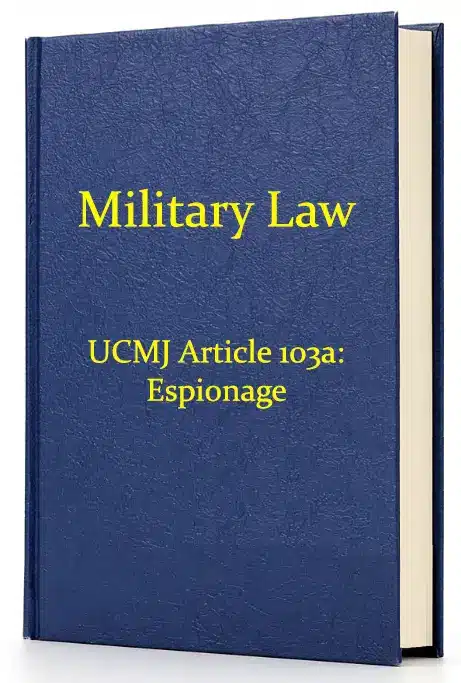Article 103a of the MCM states any person who “with intent or reason to believe that it is to be used to the injury of the United States or the advantage of a foreign nation, communicates, delivers, or transmits, or attempts to communicate, deliver, or transmit, to any entity,” directly or indirectly, information or documentation.
There are three different subheadings associated with espionage: espionage, attempted espionage, and espionage as a capital offense.
To be charged with espionage, the prosecution must demonstrate:
-
the accused communicated, delivered, or transmitted any document, writing, code book, signal book, sketch, photograph, photographic negative, blueprint, plan, map, model, note, instrument, appliance, or information relating to the national defense;
-
that this matter was communicated, delivered, or transmitted to any foreign government, or any faction or party or military or naval force within a foreign country, whether recognized or unrecognized by the United States, or to any representative, officer, agent, employee, subject or citizen thereof, either directly or indirectly; and
-
the accused did so with intent or reason to believe that such matter would be used to hurt the United States or the advantage of a foreign nation.
Charges of attempted espionage require proof that:
-
the accused did a specific overt act;
-
the act was done with the intent to commit the offense of espionage;
-
the act amounted to more than mere preparation and
-
the act tended to bring about the offense of espionage.
Espionage as a capital offense may be applicable if:
-
the accused committed espionage or attempted espionage; and
-
That the offense directly concerned
-
nuclear weaponry, military spacecraft or satellites, early warning systems, or other means of defense or retaliation against significant scale attacks,
-
war plans,
-
communications intelligence or cryptographic information, or
-
any other central weapons system or significantsentence element of defense strategy.
-
Understanding Article 103a (Espionage) of the UCMJ
The term entity refers to a foreign government, a faction, party, military, or naval force within a foreign country, whether recognized or unrecognized by the United States, or a representative, officer, agent, employee, subject, or citizen of such government, faction, party, or force.
The information or documentation referred to may consist of any document, writing, code book, signal book, sketch, photograph, photographic negative, blueprint, plan, map, model, note, instrument, appliance, or information relating to the national defense.
The accused must have intended for or had reason to believe the information or documentation provided to the other party would be used to either harm the United States or to give an advantage to a foreign nation.
Suppose the information or documentation provided is referred to as National defense information. In that case, it must be an “instrument, appliance, or information relating to the national defense includes the full range of modern technology and matter that may be developed in the future, including chemical or biological agents, computer technology, and other matter related to the national defense.”
Maximum Possible Punishment for Violations of Article 103a
Service members convicted of an Article 103a violation face the maximum possible punishment of any punishment, other than death, significant that a court-martial may direct if they are convicted of espionage or attempted espionage.
If the service member is convicted of espionage as a capital offense, they face the maximum possible punishment of death or any other punishment a court-martial may deem appropriate.
A sentence of death may only be used if the members of the court-martial unanimously agree that any extenuating or mitigating circumstances are outweighed by the offense and at least one of the following:
-
the accused has been convicted of another offense involving espionage or treason for which either a sentence of death or imprisonment for life was authorized by statute;
-
in the commission of the offense, the accused knowingly created a grave risk of substantial damage to the national security;
-
in the commission of the offense, the accused knowingly created a grave risk of death to another person; or
-
any other factor that may be prescribed by the President by regulations under section 836 of article 36.
How do you defend against Article 103a Espionage charges?
When you are facing the combined resources of the military as well as the current cultural climate, you need to be prepared to defend your career and your freedom. Crisp and Associates, LLC has a team of experienced trial attorneys who have won these cases. This team includes the firm’s founder, Jonathan Crisp, a highly respected former Army JAG with over 23 years of experience in military law and a sought-after speaker and lecturer on martial law. Donald Gordon has litigated cases before the Discharge Review Board, the Board for Correction of Military Records, and the Board for Correction of Naval Records regarding various matters and a diverse background of clients. If you or someone you know is facing Article 103a charges for Espionage, you must speak with a Military defense attorney immediately.


